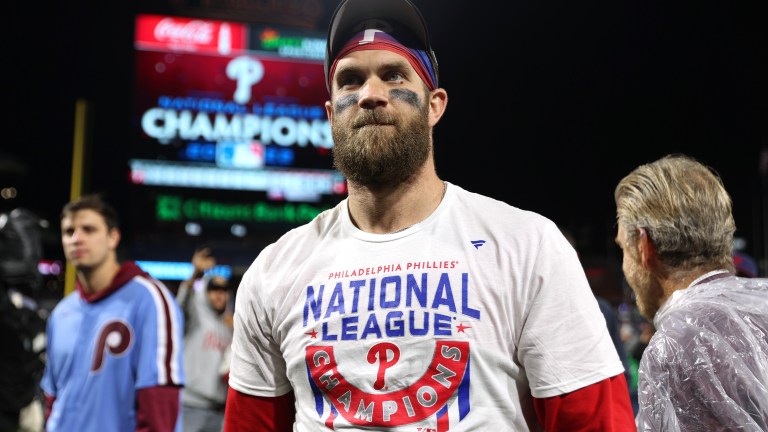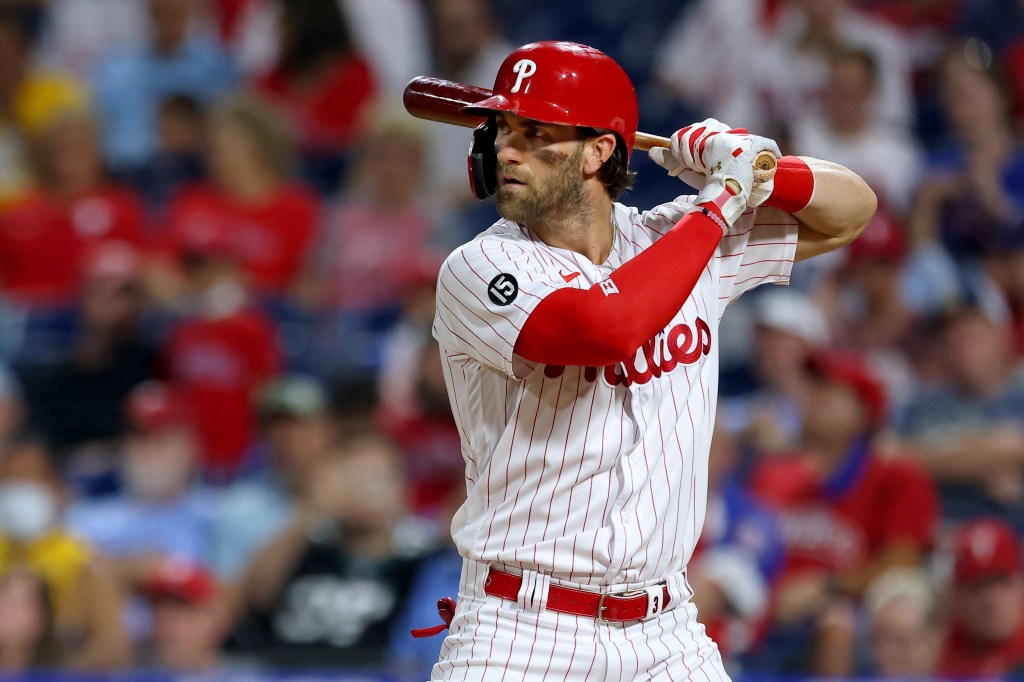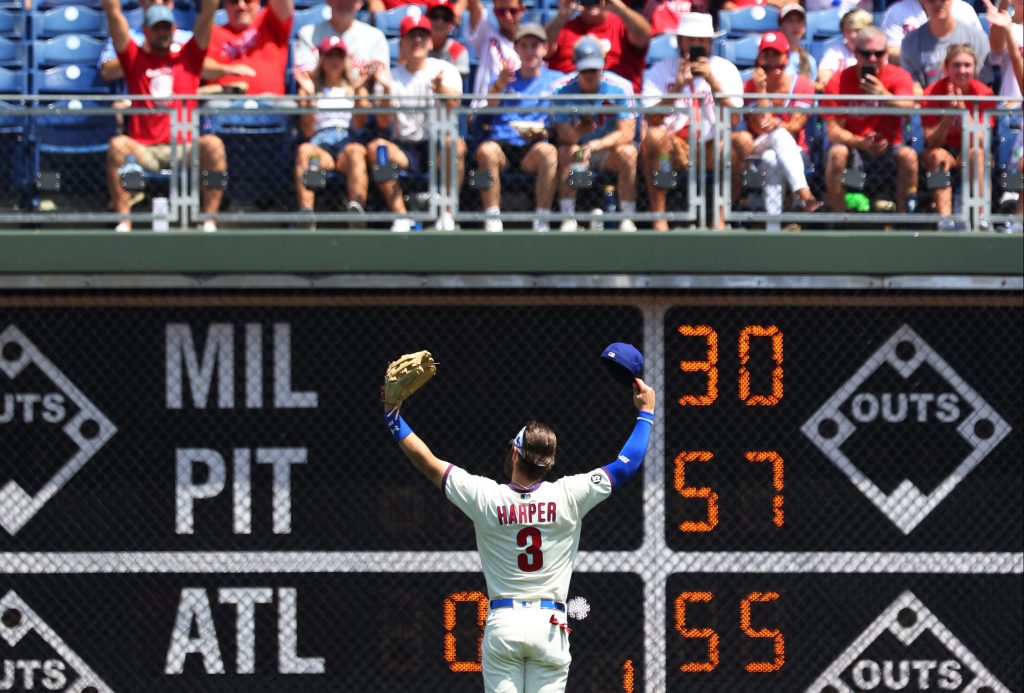What To Make of All This Bryce Harper Extension Talk
How realistic are all the rumors about Bryce Harper signing a contract extension with the Philadelphia Phillies?

Bryce Harper is under contract with the Philadelphia Phillies through 2031. For those who don’t want to bother counting, that’s eight more seasons. The two-time NL MVP will continue to earn $27.3 million per year through his age-38 campaign.
There’s no denying the Phillies got a bargain when they signed Harper to a 13-year, $330 million deal ahead of the 2019 season. There’s no simple way to calculate the dollar value of a player’s on-field performance, but look at it this way: Aaron Judge signed a nine-year, $360 million contract entering his age-31 season last winter. Trea Turner signed for 11 years and $300 million ahead of his age-30 campaign.
Harper, at what is essentially eight years and $218 million, is a steal in that regard.
With that in mind, it’s no surprise Harper and his agent Scott Boras are looking for more. There’s nothing greedy about a player who wants to be paid what he’s worth, and any agent worth his salt will never stop working to get the best deal for his clients.
Indeed, I wouldn’t be surprised to learn that Boras floats the possibility of an extension for most of his clients every winter. It’s just good business.
However, there’s a reason the Bryce Harper extension rumors are gaining legitimate traction this offseason, in a way we’ve rarely seen before. Let’s take a look.
Bryce Harper Is Underpaid

Phillies managing partner John Middleton flat-out admitted that Harper is undercompensated last October. While celebrating Philadelphia’s victory in the 2022 NLCS, the owner took his star player by the shoulders and said, “I think I’ve underpaid you. I’m not sure you can underpay somebody when you give them $330 million, but I’m pretty sure I underpaid you.”
There’s nothing controversial about the content of Middleton’s statement – it’s what everyone was thinking when Harper took Robert Suarez deep for the go-ahead home run in Game 5 of the NLCS. However, it never sat well with me that Middleton was the one to deliver those words.
Can you imagine if your boss grabbed you by the shoulders, looked you in the eyes, and exclaimed with glee that you deserved more money? Keep in mind, this is the one person who has the power to give you that money. This is the person lining their own pockets with your accomplishments. And this person dares to tell you that you should be making more money, but they aren’t going to give it to you.
Bryce Harper isn’t like most of us. He makes more money than he could ever possibly spend in his lifetime. I can’t claim to presume he was offended by Middleton’s comments.
Still, it comes as absolutely no surprise that Harper and his agent are putting out feelers for an extension this winter. He knows he’s underpaid. He knows he wants to spend the rest of his career in Philadelphia. There’s no downside to working out a new deal.
What Do the Phillies Have To Gain?

The question, however, is why on earth the Phillies would entertain such a possibility. They already have Harper under team control through the prime of his career. It’s practically impossible to estimate how valuable he’ll be in 2032, but suffice it to say, the aging curve isn’t on his side.
Over the last 15 years, only 15 players age 39 or older have qualified for the batting title. Only seven were above-average offensive contributors. Only six were worth more than two Wins Above Replacement, per FanGraphs: Nelson Cruz (twice), David Ortiz (twice), Carlos Beltrán, and Alex Rodriguez.
Without the playing time minimum, three more players age 39-plus have crossed that 2.0 WAR threshold: Jim Thome, Chipper Jones, and Jim Edmonds.
If you increase the age range to 40-plus, only Cruz, Ortiz, Jones, and Edmonds make the cut. Increase it by one more year, and the only player with a two-win season in the last thirty years is Barry Bonds.
Simply put, it’s incredibly difficult to be an above-average regular after 40 years of wear and tear on the body. That’s not to say older hitters can’t be valuable role players, but even that is rare, especially for a first baseman/DH. In the last 15 years, only 12 different players (across 17 individual seasons) have provided above-average offense (wRC+ over 100, min. 200 PA) at age 39 or older:
| Season | Player | G | PA | HR | wRC+ | WAR |
| 2010 | Jim Thome | 108 | 340 | 25 | 177 | 3.1 |
| 2020 | Nelson Cruz | 53 | 214 | 16 | 166 | 2.0 |
| 2016 | David Ortiz | 151 | 626 | 38 | 163 | 4.5 |
| 2022 | Albert Pujols | 109 | 351 | 24 | 149 | 1.7 |
| 2015 | David Ortiz | 146 | 614 | 37 | 139 | 2.9 |
| 2015 | Alex Rodriguez | 151 | 620 | 33 | 129 | 2.7 |
| 2011 | Jim Thome | 93 | 324 | 15 | 129 | 0.9 |
| 2012 | Chipper Jones | 112 | 448 | 14 | 127 | 2.6 |
| 2010 | Jim Edmonds | 86 | 272 | 11 | 127 | 2.4 |
| 2021 | Nelson Cruz | 140 | 584 | 32 | 123 | 2.0 |
| 2016 | Carlos Beltrán | 151 | 593 | 29 | 122 | 2.3 |
| 2009 | Gary Sheffield | 100 | 312 | 10 | 122 | 0.3 |
| 2013 | Raul Ibanez | 124 | 496 | 29 | 121 | 0.8 |
| 2011 | Chipper Jones | 126 | 512 | 18 | 120 | 1.8 |
| 2016 | Ichiro Suzuki | 143 | 365 | 1 | 102 | 1.4 |
| 2012 | Raul Ibanez | 130 | 425 | 19 | 102 | 0.5 |
| 2016 | David Ross | 67 | 205 | 10 | 101 | 1.9 |
Bryce Harper is a future Hall of Famer, and I wouldn’t be surprised to see his name on a list like this one day. Even so, there’s no reason for the Phillies to spend extra money today just to secure Harper for his age-39 season and beyond. If he remains productive and wants to prolong his career closer to the end of his current deal – let’s say in 2030 – that’s when an extension might make more sense.
But wait!
There might be some financial incentive for the Phillies to shock the baseball world and extend Harper after all.
It’s All About the Money
First and foremost, we’re talking about the luxury tax here. Harper’s contract is already well-designed for luxury tax purposes. His $27.3 million AAV accounted for just over 10% of the team’s luxury tax payroll last season; that’s practically nothing for a superstar of his level.
That said, if the Phillies extend him for another three years or so, they could bring down the luxury tax hit even further. Let’s say the two sides agree on a new 11-year, $248 million deal (canceling out the eight years and $218 million remaining on his current contract). That guarantees Harper an extra $30 million – equivalent to $10 million a year from ages 39 to 41 – and it would bring his annual average salary down to $22.5 million.
It’s possible the commissioner’s office would veto such a deal; they have stepped in before to prevent luxury tax manipulation. However, a long-term deal that runs through a player’s age-41 season is hardly unprecedented, and it would be hard to disagree that Harper will be worth at least $248 million over the next 11 years.
On the one hand, it would be pretty obvious that avoiding the luxury tax was Philadelphia’s main incentive to sign such an extension. On the other hand, avoiding the luxury tax is why they signed Harper to a still-unprecedented 13-year free agent deal in 2019.
Simply put, the distinction between acceptable and unacceptable luxury tax manipulation is fuzzy. It’s hard to guess where exactly the league will draw the line.
However, as long as the Phillies can get the commissioner’s office on board, a deal like this could work out well for both sides.
No free agent hitter has ever earned a $30 million guarantee at age 39, let alone the security of such a guarantee eight years in advance. Meanwhile, the Phillies could use all the payroll wiggle room they can get as they try to build a championship-caliber team without incurring the harshest competitive balance tax penalties.
Harper gets his money and extra job security, while the Phillies bring down their luxury tax payroll. Maybe this isn’t so far-fetched after all…
Even in the worst-case scenario, in which Harper faces a steep decline and ends up as dead weight at the end of his contract, an extra $30 million is hardly going to break the bank for the Phillies. Heck, even if he’s nothing more than a de facto player-coach and a left-handed bat off the bench, $10 million a year doesn’t seem like such a bad price for one of the most important players in franchise history.
On a similar note, there must be some positive financial value to ensuring that Harper remains a Phillie for the rest of his Hall of Fame career. Fans will continue to pay to watch Harper even when he is old and gray (by baseball standards, that is). Moreover, an extension now could prevent him from leaving for Las Vegas someday down the line, whether as a player, coach, or front office advisor.

There isn’t even a baseball club in Las Vegas quite yet, but it’s already time for the Phillies to start laying the groundwork and playing 3-D if they want Harper to resist the call of his hometown team.
An extension for Bryce Harper still seems unlikely. It would be completely unprecedented, to say the least, and the commissioner’s office might refuse to play ball. That said, it’s not nearly as ridiculous as it first seemed when the rumors began to leak.
Of course, Harper wants more money. Of course, Scott Boras wants to get it for him. And believe it or not, the Phillies could come out on top from such a deal, too.
